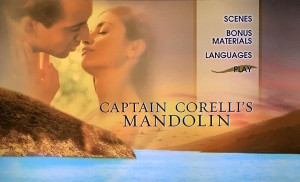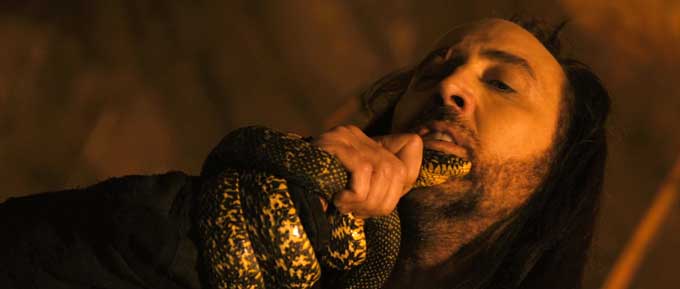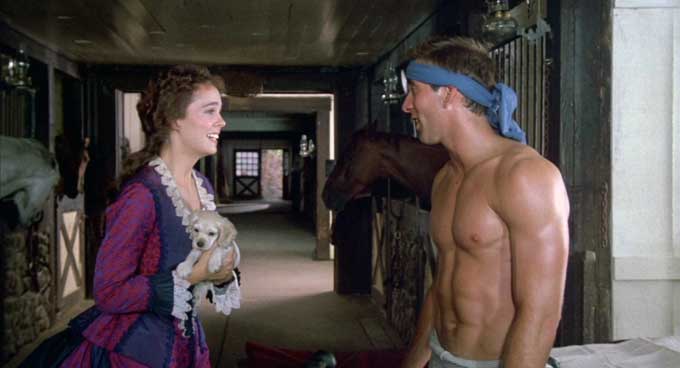Captain Corelli’s Mandolin (2001) : Make Love, Not War [Mike’s review]
Today on Cage Club we find love in a time of war in “Captain Corelli’s Mandolin”. This movie finds Cage back in a World War 2 setting as an Italian Soldier. This is the second time Cage has portrayed an Italian Soldier as part of an invading army on CageClub, the last time being his leprosy panicked Enrico from “Time to Kill”. In that film, Enrico was stationed in Ethiopia, but this movie takes place on the beautiful Greek island of Cephalonia. The location is real and amazing, really adding to the realism of the story, which is based on actual events.
It’s one of several War films that Cage has been in, including the Vietnam film “Birdy”, the going off to War film “Racing the Moon” or the yet to come “Windtalkers”. War has always been a big theme for Cage ever since “Best of Times” when he faced the camera and spilled his guts about his fears of having to go off and fight a War like his forefathers.
Cage plays the title character Captain Antonio Corelli, a man driven by music, love and passion, even in time of War. His mission in life seems to be, make love not war, which is hard to do when you are part of an invading army. Corelli and his men descend upon the island as retaliation for losing a previous battle against the Greeks. The island inhabitants must learn to co-exist with the Italian regiments, which means singing, dancing and falling in love. Hardly the sort of tactics one might expect. But it is clear that Corelli and his men are not the hard edged fascist bastards that his bosses are. These men were plucked from their village and given weapons, then told to go take over this island. Corelli is kind of a prisoner too. He has no love for the Axis, and just wants to get back to his homeland and play Mandolin all the time.
While stationed on the island, Corelli catches the eye of Pelagia, the beauty, played by Penelopy Cruz. She is betrothed to her childhood sweetheart, Mandras, played by Christan Bale, but Mandas is off fighting on the front, with the rest of the village’s young men. The two of them grow closer as Pelagia and her father are forced to give room and board to Corelli and have put up with his poetic nature and Mandolin playing. Although they are essentially prisoners in their own home, Pelagia and her father, along with some of the townsfolk, come to grow fond of Corelli and his men. They can separate them as people from what they are forced to do under the heel of the Nazi’s. Overtime, Pelagia falls in love with Corelli, who has always loved her. But they are doomed as the war threatens to take everything from them.
When the Allies start to beat back Mussolini and Hitler, Corelli and his men are allowed to go home provided they surrender their arms to the Nazi. This doesn’t sit well with Corelli. Rumors of dead Italians betrayed by the Germans, combined with some of his own men being gunned down for practically no reason by a Nazi soldier, forces Corelli to choose a side and really fight for the first time in his life. He must fight an actual war as a metaphor to his fight for Pelagia’s love. Corelli teams up with Mandras, sneaking him supplies and planning to hold the beach against the full on force of a German invasion. They stand no chance as the Nazi War Machine makes an example out of the small island village, torching and destroying everything they can after a brutal bombing campaign. Corelli is captured and thought dead from a firing squad, until he’s recovered by Mandras and delivered to Pelagia for healing. He is put back together with parts of his Mandolin, fusing with his symbolic weapon of choice. He is led to safety by Mandras and forced to leave his love in order to live. Years later, after the war, Corelli returns to the small island village and is reunited with his true love, Pelagia.
I really enjoyed this story and found it to be an unconventional World War 2 movie. I liked how it dealt with a very remote part of the world and showed that everyone was involved weather they liked it or not. The one thing that must be talked about when discussing this movie is the accents. I understand that you had people speaking Greek, Italian and German in the film and could not have them all speak in different languages with subtitles no matter how much better and more authentic it would have made this movie. This film had some big stars in it and in the end it was a big Hollywood movie, so they had to appease the general audience and leave the subtitles at home. But, it causes some issue for me with the accents. You have Penelope Cruz speaking with her natural accent which is fine. But, then you have Christian Bale who is doing a Greek accent over his English accent. Then you have Nic Cage doing his exaggerated Italian accent too. It’s a little much for me at times. Just when I feel like it is working for me there will be a scene with cage and Bale in it and it’s like dueling accents and I can’t concentrate on the plot. I am drawn out of it thinking about how much better it could have been if they even just spoke in their normal voice. While it drew me out at moments it also did help to elevate some of the dramatic tension with a flare of comedy, intentional or not.
That should do it for this entry on Captain Corelli’s Mandolin. I was not expecting to like this film so much but I guess by now I should know how good Cage is in the dramatic love story role. I think this film has some beautiful shots, some really great Cage moments and a lot to enjoy. Next up on Cage Club we close out the Cage Christmas Trilogy with the animated adaptation of “Christmas Carol : The Movie”. This is the last of the Cage X-Mas films but the very first time Cage is an animated character. Join us as we revisit some themes from “The Family Man” and get to the bottom of this Christmas Classic.
Mike
@the_mikestir




